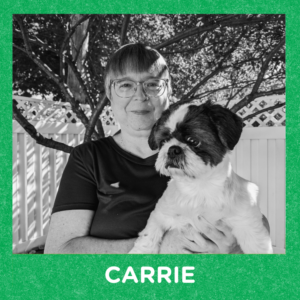Next month, we will observe and celebrate International Day of Persons with Disabilities on December 3. At WCC, we’re reflecting on our ongoing commitment to improve workshop accessibility and reduce community barriers.
Meet Carrie Hartwick, a WCC writer and volunteer facilitator, who facilitates workshops in proud partnership with the Canadian Hard of Hearing Association in Ottawa. We asked Carrie to tell us about her volunteer experience and the significance of the connections forged in WCC workshops.
DESCRIBE YOUR JOURNEY AS A WCC FACILITATOR – HOW DID YOU FIND US, AND WHEN DID YOU BECOME A FACILITATOR?
CARRIE: My journey to become a WCC facilitator was quick. I volunteered at Ottawa’s Centretown Community Health Centre and, at a meeting, WCC (then Toronto Writers Collective) was mentioned.
When the staff asked if anyone was interested, my hand shot up before the question was finished! The writer in me was going, ‘yes’. I think it was January of 2020 when I was trained. Just three months later, the pandemic started…
WHAT BRINGS YOU TO VOLUNTEERING? HOW DOES FACILITATING WORKSHOPS FOR THE HEARING LOSS COMMUNITY ALIGN WITH YOUR OBJECTIVES AS A VOLUNTEER?
CARRIE: I volunteer because I can. I like the feeling of giving back to my community and, while I am volunteering, I learn more about myself and others. I gain skills or improve the skills I already have.
During my facilitator training, I blurted out how these workshops would be great for others with hearing loss. The idea was embraced by WCC staff. Facilitating workshops for others with hearing loss is two-fold for me. I wanted to meet other people with hearing loss and I wanted to give them a safe space to write.
WHERE DOES WRITING FIT IN THE LIVES OF INDIVIDUALS WHO ARE HARD OF HEARING? WHAT DO YOU EXPERIENCE IN A WCC WORKSHOP, WHEN HARD OF HEARING INDIVIDUALS WRITE IN COMMUNITY?

CARRIE: Oh! To be part of a hearing loss community…
You see, it was about two years ago when I discovered that I was trying to live as a hearing person, even though I was born with hearing loss. At this point, I was working in retail, and everyone wore masks… it was a frustrating time to say the least, as lip reading was next to impossible. I did discover apps that that translated spoken words to text and that worked well.
I can now say that I am hard of hearing and have no shame. I feel other people with hearing loss want to express their experiences in writing workshops, and by providing professional captioning, everything comes to life.
WHAT IMPACT HAVE YOU WITNESSED THROUGH FACILITATING A BRAVER SPACE WHERE PARTICIPANTS CAN DISCOVER AND EXPRESS THEIR AUTHENTIC SELVES?
CARRIE: First off, one writer I’ve met accesses multiple Zoom workshops with WCC and appreciates the availability of professional captioning. And in our workshops, writers can connect with others when they write about their hearing loss experience and read their writings together. Participants who mentioned that they would not read aloud, usually end up do so. We all witness each other’s transformation and courage.
WHAT IS THE SIGNIFICANCE OF FACILITATING WRITING WORKSHOPS FOR THE HEARING LOSS COMMUNITY? WHAT IS IMPORTANT ABOUT THESE KINDS OF SPACES?
CARRIE: Community is very important and WCC’s Six Essential Practices create a safe space to both write and share in community. I want those who have hearing loss to know that they matter, just like I do.
I think for me, the fifth Essential Practice – the workshop facilitator writes and reads too, taking the same risks as everyone else – is crucial for these spaces. As facilitators, we need to lead by example and show that we, too, must be brave. If I am honest, I want to be heard as well.
WHY DO YOU WRITE? TELL US ABOUT YOUR RELATIONSHIP TO WRITING!
CARRIE: I write because it helps me to identify my own truths and often, while I am writing, I start off with my challenge and then along the way a solution or personal realization materializes! A lot of my writings are based on nature, as being in nature always grounds me. I have been writing poetry and short stories for many years.
I have been in recovery for over 30 years and in the beginning, I could not verbalize my emotions and would journal or write poetry/short stories. What’s interesting is the poetry/short stories did not make much sense to me then… today, they speak volumes to me.
Thank you, Carrie, for your steadfast work as a WCC facilitator. We are proud of how you forge inspiring community connections in every workshop.
